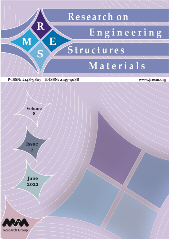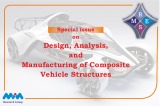Research Article
Properties of self-compacting concrete modified with ultrafine slag
Bode Venkata Kavyateja1, Canga Narasimha Reddy2, C. Arvind Kumar3
1Department of Civil Engineering, Jawaharlal Nehru Technological University, Anantapur, Andhra Pradesh, India
2Department of Civil Engineering, Sri Venkateswara College of Engineering (Autonomous), R V S Nagar, Chittoor, Andhra Pradesh, India
3Department of Civil Engineering, Matrusri Engineering College, Hyderabad, Telangana, India
Keywords
Abstract
Self-compacting concrete;
Ultrafine slag;
Hardened properties
Self- Compacting concrete (SCC) is a special type of concrete that is able to flow and compact under its own weight and can occupy all the spaces in the form without any vibration effect, and at the same time cohesive enough to be handled without bleeding or segregation. The required compaction properties are achieved by adding super-plasticizers and mineral admixtures such as fly ash, rice husk ash, silica fume, ultrafine slag etc. The utilization of these treated industrial by-products as cement replacement will not only help to achieve an economical SCC mix, but it is envisaged that it may improve the hardened properties, microstructure and consequently the durability of concrete. This provides solution to disposal problems and other environmental pollution issues created by these otherwise waste products. This paper presents the results of an experimental study aimed at producing SCC mixes incorporating constant dosage of fly ash (i.e., 30%) and varying dosage of ultrafine slag (i.e., 0-60%) as supplementary cementing materials. Also, this paper gives the comparison of these SCC mixes in terms of their properties like compressive, young’s modulus and flexural strengths. The fresh concrete properties are also included in the study. Addition of constant dosage of fly ash (i.e., 30%) and ultrafine slag (i.e., 30%) showed a significant improvement in fresh and hardened properties of SCC.
© 2021 MIM Research Group. All rights reserved.

